Inside Tracker gives you a score for each marker that you are tested for (magnesium, vitamin D, cortisol ect). That part is pretty standard for any blood test, obviously dependent on what the physician (or whoever is requesting the result) asks for, but inside tracker takes it one step further.
They give you a graph showing an optimal level of each marker for you. It shows you where your number falls, and whether that is higher or lower than the optimal level. Beside each graph it gives you some foods to try to increase your intake of (if you do not fall in the optimal range), and some other recommendations on how to make that number fall into the recommended range.
It also shares why this particular marker is important, the science behind why you need to keep this number where you do with links to references as to where they got this information from.
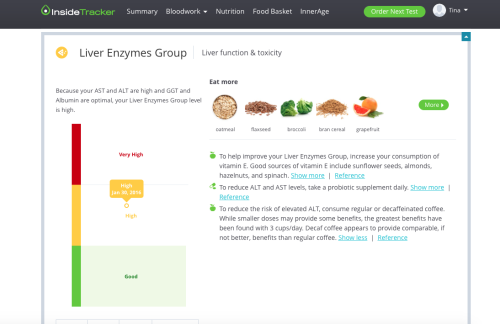
On the next page, they give you a goal sheet of what you need to work on. As this can be overwhelming, it asks you to select 5 things that you want to focus on for the next few months as part of your action plan. This involves the changes you think you could most easily make to your diet and lifestyle to improve your figures.
Finally, it gives you the inner age that your body is at based off your biomarkers. This can be brought down (if it is higher than your birth age) by making the changes recommended with your focus foods.
You can get your blood work retested at a later date to see how you are doing, and it will compare your results to your previous blood work.
So what did my blood work show?
Overall, as I have found from previous analyses, I am doing pretty darn well.
18/30 of my biomarkers were in the optimal ranges, and once again, I found myself unable to decide if I felt more smug that I am so good at getting in the right foods to fuel my body (once again proving that I DO eat enough…..just in case I hadn’t made that obvious enough :P) or whether I felt frustrated that my body did not show signs of overworking like I thought…..making me wonder if I just think I have too much on my plate when my body is handling it just fine!
Of course I did have some numbers that fell outside of optimal; 8 of my markers “need work” and two are “at risk”.
The at risk markers were the ones that are always off for me; liver enzymes (ALT and AST) are too high, but that is expected based off my hard training. I do need to work on decreasing this, but it is not too much of a cause for concern.
Other numbers that were sub optimal:
Vitamin D: too low
Resting blood glucose: too high
Vitamin B12: too high
Creatine Kinase: too high
LDL Cholesterol: too high
DHEAS: too low
My “inner age” based on my markers was 36.2 (that means my body is 8 years older than I am based on how I am treating it!)
I was extremely thankful that after my results were in, Inside Tracker hooked me up with their nutritionist, Ashley, who I talked to for almost an hour about my results, my training, my nutritional intake. It was possibly one of the best spent hours I have ever had, especially when it comes to fueling correctly. She was fantastic, as was their sales manager (and now my friend, Jonathan).
I always thought I knew a lot about nutrition, and I think I do, when compared to most people, but this was very helpful as she was able to weave together recommendations (some separately to the overall recommendations from Inside Tracker) based off the whole picture of my training, nutrition, and markers.
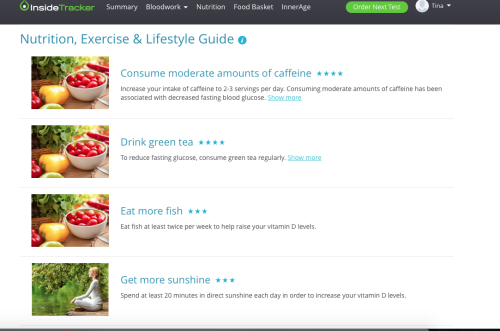
The recommendations I was given by the nutritionist were:
- Take a psyllium husk supplement (to reduce LDL)
- Increase my fish intake to at least 2 times per week (to increase my vitamin D and increase DHEAS)
- Use beans as a protein source for at least one meal per week (to reduce LDL)
- Drink 2-3 servings of green tea per day (to decrease my fasting blood glucose)
- Drink coffee which was a shocker! (to decrease my ALT levels)
- Increase caffeine intake separately recommended to the coffee (to decrease my fasting blood glucose)
- Take a probiotic daily (to decrease ALT and AST levels)
- Participate in more stress reliving activities (HA! Me? Never?! :p) such as yoga and meditation
So far, I have started with the psyllium husk and beet greens supplements. I have increased my fish and green tea consumption, and I had my first EVER coffee on Thursday based on their recommendations.
I am embarrassed to admit, that even though I got a mocha, I could not make it through the whole thing. I drank about half of a tall drink from Starbucks, but it was just too…..well….coffee for me. I intend to keep trying different drinks though and build it up.
By the way, in case you are curious, the reason they recommend coffee as opposed to just tea with a little caffeine, is for three reasons:
- Gives your heart a little mini workout, which is good for your heart health
- Numerous studies have found it lowers fasting blood glucose levels, which is one of the markers I need to work on
- It is packed full of antioxidants that will help me as a runner and athlete
Oh, and in case you didn’t already know, caffeine has been linked to performance improvements in running, so that can’t do any harm 🙂
Inside Tracker makes it nice and easy to see which foods are recommended based on your at risk and needs work numbers. They give you a nice list of foods to consume, and foods to stay away from, and you can even put in your dietary preferences to tailor the list to you further.
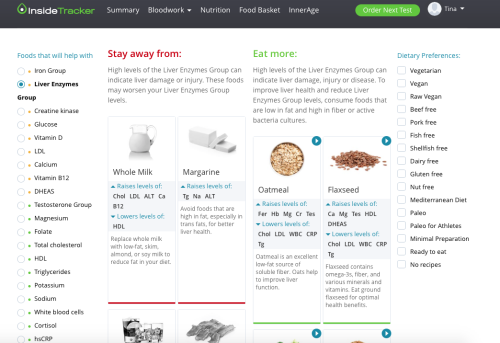
If you are thinking about going to see a nutritionist, or want to do everything you can nutritionally to help your training, I really would recommend giving Inside Tracker a chance. I am so glad I have used them, and they really make it so easy to optimize what is best for you, and you only rather than just giving you general recommendations!
I got the Ultimate Athlete Package, and you can use my discount code “tinamuir” for 10% off.
Yes, it may be a little pricey, but for your long-term health, not just as a runner, but as a person who cares about their body, it is worth it 100 times over!
Once I have the results for the remaining tests Tawnee requested, I will check in again, but for now, I am off to look after my little engine that has helped me chase my running and life goals!
Oh, and Tawnee is also a HUGE fan of Inside Tracker (which I did not know when I signed up to work with her!).
Have you ever looked at your blood analytics in detail?
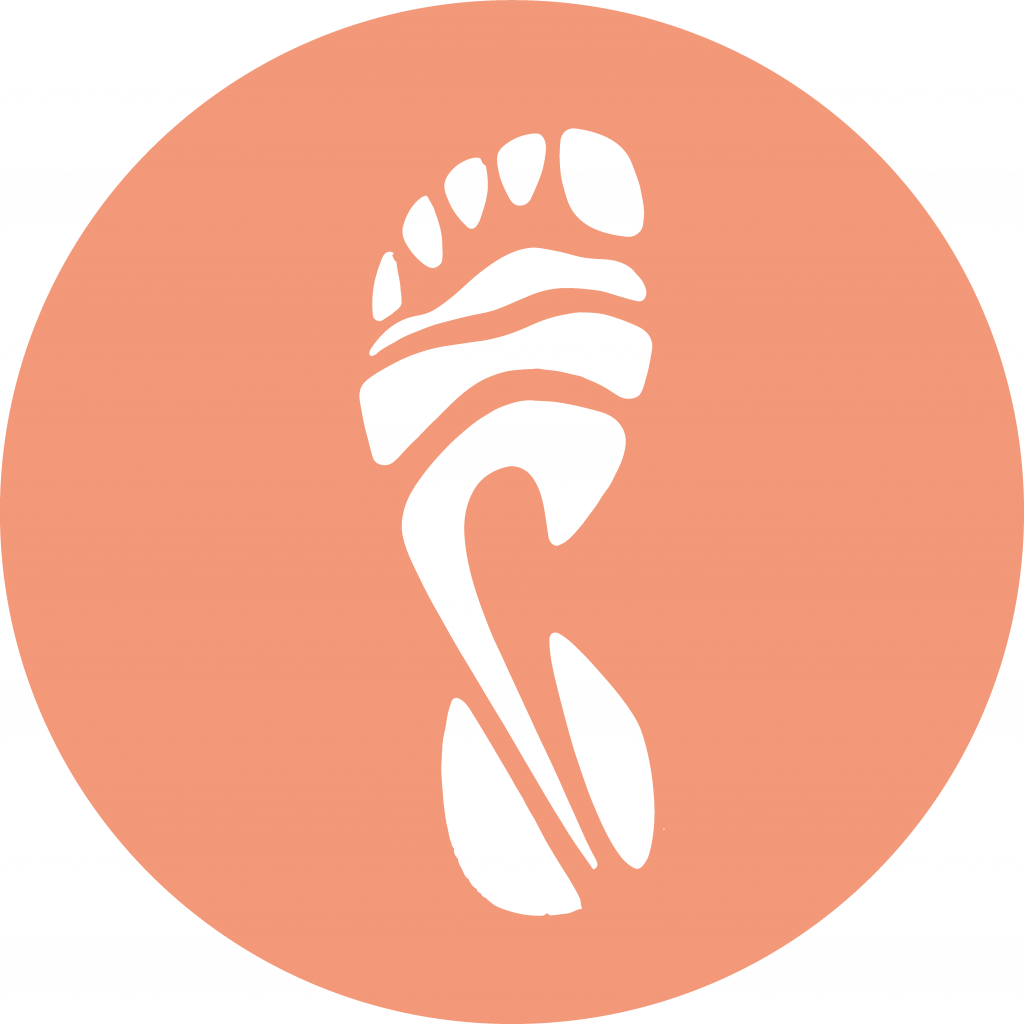
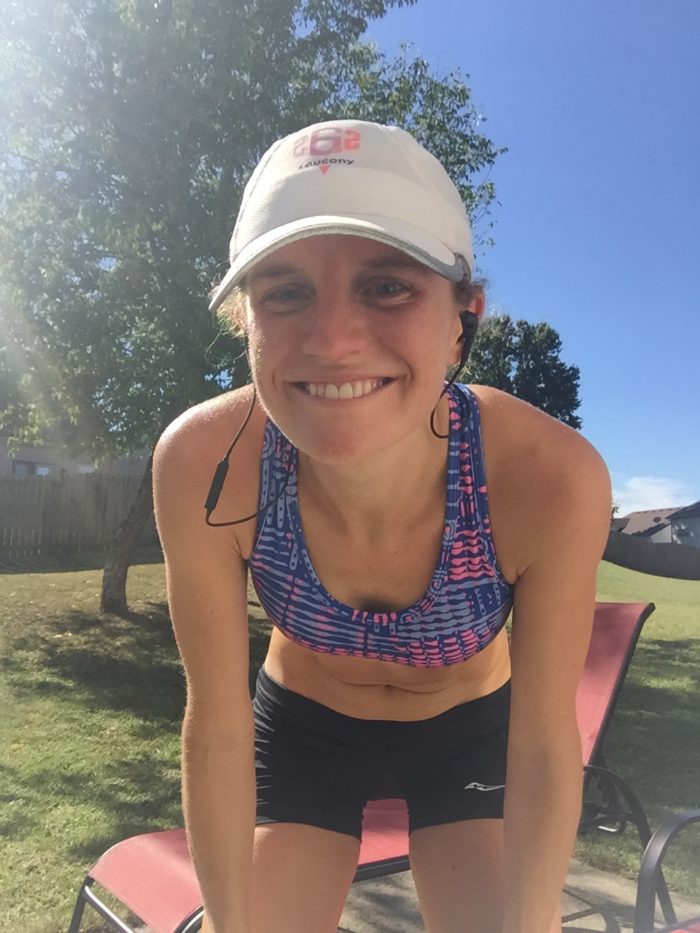


12 Comments.
I’ve read quite a bit about this lately and it’s peaked my interest. Of course, I’ve had standard blood work done when I get a yearly physical but it’s all been “normal”. I like that Inside Tracker goes more in depth. Looking into it! And if you thought a Mocha tasted too coffee like, I’m not sure you are going to find one you like! Maybe coffee ice cream? lol!
I’m always intrigued about people’s nutrition and blood stats. I think your nutrition always “looks” good until it doesn’t. It’s crazy to think there are a few nutrients that are a little bit lower, yet you feel great normally. Interesting read Tina and I’m glad it worked for you.
I love stuff like this. I think it’s fascinating.
However a small voice inside me does worry that we’re all getting a little too obsessed with using gadgets and tools to find out about EVERYTHING about ourselves and losing the introspection and natural ability we all have to judge what we’re feeling. While I do have those concerns I’d still love to do the test… it’s a catch 22!! How much information is too much information? Back in the day before HR monitors, Garmins, tests etc. it was just people running races and smashing out amazing times. We haven’t got much faster but the technology has got better… it’s interesting!
I do a full blood work up each year with my DR and always find it interesting. The fasting glucose is really important to watch as you age and that is one of his big issues. It is always fascinating!
That is really really neat! I actually analyze blood for a living so this was extra cool for me. Coffee is actually the number one source of antioxidants in the American diet. Have you tried a latte? I like mine with 2% milk because it really cuts down on the acidity and bitterness. Good luck to you!
This is fascinating! I really find it so interesting and like how it recommends specific foods for you based off of what’s in your blood. A weird tip on coffee: I brew my own (2/3 cup of grounds for one 12 cup pot) with a pinch of salt in the ground, because the salt cuts the bitterness during the brewing process. I can’t do Starbucks coffee either (too bitter).
I’ve heard a lot about this and I’m intrigued by it but also nervous about what I’d find. I definitely eat more sugar than I should but I feel like getting tested *could* send me down an obsessive path. I do think tests like this can really help athletes optimize their performance and for that reason, it would absolutely be worth it.
That’s so interesting! I’ve been seeing a naturopath to look at some of my hormone levels to get them into an optimal range, instead of just the “eh, we think its normal” range that most doctors use.
Really interesting!! I am very curious about this. I feel like I am always wondering if I am making the right choices in food for fuel. I am a super healthy eater, but would love to take the next level for optimal running performance. Great post Tina!
Sounds very interesting and helpful to find out exactly what is happening on the inside. Would love to get this done!
Wow this is fascinating! Thank you for sharing this with us. I tend of overanalyze any health data I receive. I wish I had had detailed health data taken last summer when I was on the verge of collapse from an incredibly stressful time at work. After leaving my job and focusing on my health for a few months, I would be really interested in the changes…mostly to validate (at least for me) that stress has huge impacts. Anyways, interesting read!
Hi Tina, really interesting and I think you and I share a number of similarities though I’m not as fast a runner as you ;-). High fasting glucose and low DHEAs – indicative of high cortisol and something called pregnanalone steal? Where vit D used to produce stress hormones at expense of sex hormones? Plus high glucose given that cortisol stimulates blood sugar response? High LDL because other hormones (sex hormones) aren’t being produced as they could be so aren’t using cholesterol effectively? Plus with low vit D status this will impact on ability to make hormones. Just some thoughts. Good luck, great writing. 🙂